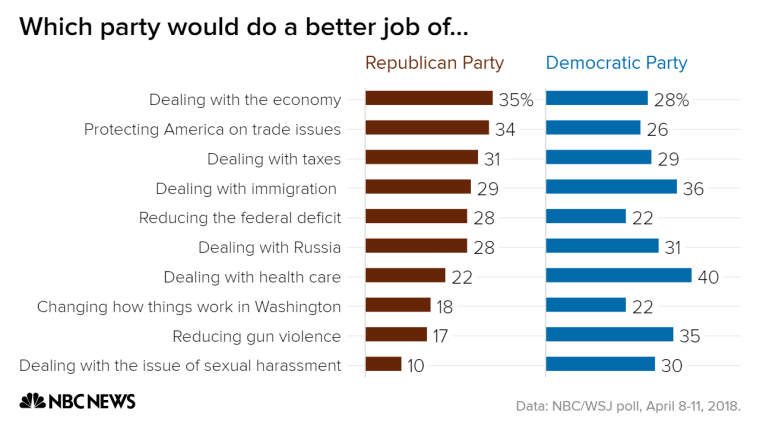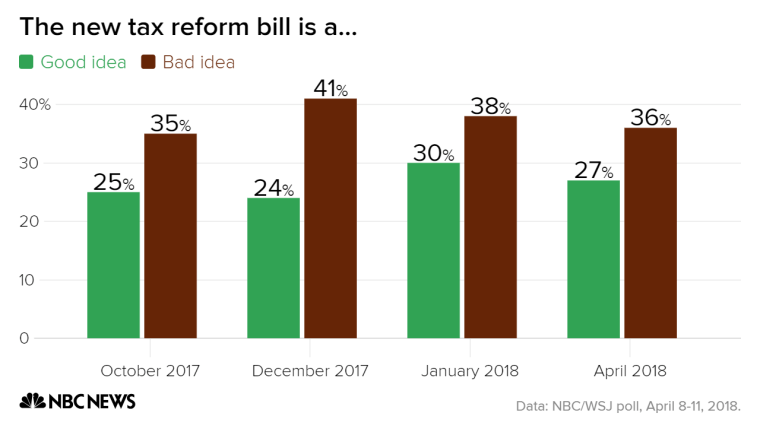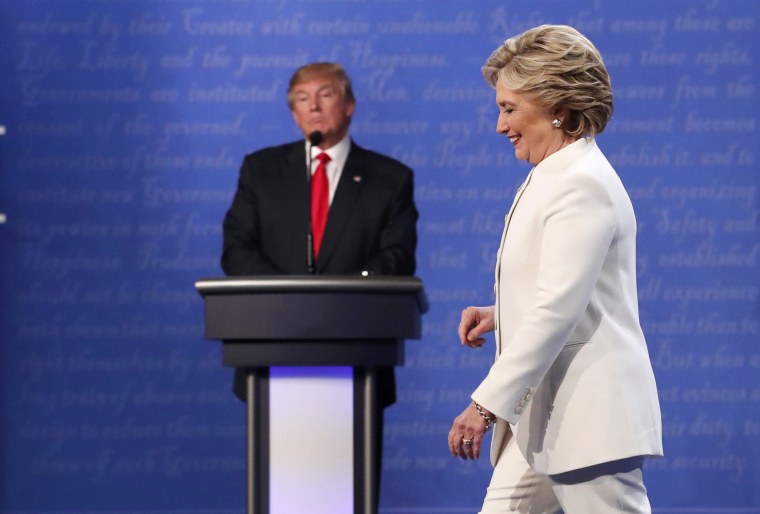WASHINGTON — One of the keys to President Trump’s victory in 2016 — and to his overall political survival — has been to claim, essentially: “Hey, I’m not Hillary Clinton.” Indeed, voters who disliked BOTH Clinton and him ended up siding with the Republican in 2016.
But that talking point doesn’t work for Trump anymore, even as Clinton remains highly unpopular, according to the latest NBC/WSJ poll.
In the NBC/WSJ poll's merged polling for 2016, 18 percent of voters disliked both Clinton and Trump, and they tended to be Republicans who preferred the GOP to control Congress:
Political affiliation
- Republicans: 43 percent
- Independents: 21 percent
- Democrats: 28 percent
Congressional preference
- GOP: 50 percent
- Dem: 35 percent
But in the April 2018 NBC/WSJ poll, voters who dislike both Hillary and Trump make up 15 percent of voters, and they are more Democratic and prefer the Dems to control Congress:
Political affiliation
- Republicans: 21 percent
- Independents: 28 percent
- Democrats: 39 percent
Congressional preference
- GOP: 18 percent
- Dem: 60 percent
NBC/WSJ co-pollster Bill McInturff (R) says that the bipartisan disapprovers are clearly different voters between 2016 and now, but it’s also clear that they won’t be Republican voters in 2018 – and maybe beyond.
Who’s popular and who’s not in the NBC/WSJ poll
Here are the positive/negative numbers for the six political figures or institutions/movements that the latest NBC/WSJ poll measured:
- March For Our Lives: 37 percent positive, 17 percent negative (+20)
- Robert Mueller: 28 percent positive, 19 percent negative (+9)
- ICE or Immigration and Customs Enforcement: 34 percent positive, 26 percent negative (+6)
- James Comey: 22 percent positive, 20 percent negative (+2)
- Donald Trump: 35 percent positive, 53 percent negative (-18)
- Hillary Clinton: 27 percent positive, 52 percent negative (-25)
GOP regains lead on the economy, Dems remain ahead on health care
The latest NBC/WSJ poll also shows Republicans regaining their lead on which party better handles the economy (after losing it in December), while Democrats are ahead on health care, immigration and Russia.

Republican tax law stays underwater
While Republicans lead on the economy and taxes, the NBC/WSJ finds Trump’s tax law remaining unpopular. In the survey, 27 percent of Americans believe the tax law is a good idea, versus 36 percent who think it’s a bad idea (-9). Back in January — a month after the legislation was signed into law — it was 30 percent good idea, 38 percent bad idea (-8).

And when the survey asks a more detailed question about the law, the Democratic messaging is more popular than the GOP messaging: 53 percent see the law as more of a negative because it increases the federal deficit and mostly benefits the wealthy and big corporations, while 39 percent see it more as a positive because it improves the economy, increases jobs and gives average Americans a tax cut.
The circumstantial evidence about Trump’s behavior toward Russia continues to add up
“President Trump on Monday put the brakes on a preliminary plan to impose additional economic sanctions on Russia, walking back a Sundayannouncement by U.S. Ambassador to the United Nations Nikki Haley that the Kremlin had swiftly denounced as ‘international economic raiding,” the Washington Post reports.
More from the New York Times: “Speaking later with reporters aboard Air Force One as Mr. Trump headed to Florida, [White House Press Secretary Sarah Huckabee] Sanders added that ‘the president has been clear that he’s going to be tough on Russia, but at the same time he’d still like to have a good relationship with them.’”
If it was just one or two examples of Trump displaying cozy behavior with a geopolitical adversary, then you could dismiss it as a coincidence. But it’s not just one or two examples.
By the way, the new NBC/WSJ poll finds a whopping 74 percent of Americans believing Russia is more of an adversary than an ally, compared with 54 percent who say the same thing about China.
Sean Hannity is Michael Cohen’s mystery client
“Sean Hannity, the Fox News host who has been waging war on the air against special counsel Robert Mueller and is an outspoken advocate for President Donald Trump, was revealed Monday as one of only three clients that Michael Cohen, the president's personal attorney, had during 2017 and 2018,” per NBC News.
“Hannity addressed the news on his AM radio show, claiming that while he never retained Cohen in the "traditional" sense, they still had attorney-client privilege. ‘Michael never represented me in any matter, I never retained him in the traditional sense as retaining a lawyer, I never received an invoice from Michael, I never paid legal fees to Michael,’ Hannity said, before adding, ‘We definitely had attorney client privilege because I asked him for that but, you know, he never sent me a bill or an invoice or did I actually officially retain him.’”
